Student Blog
Life Hacks
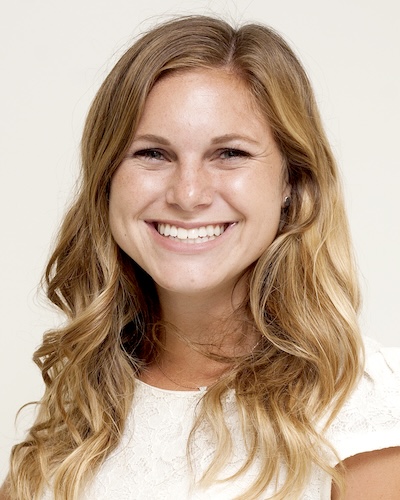
Winter Break: Perks of still being a student! ⟩
January 12, 2018, by Ali
Life Hacks
Hello and Happy New Year! After the stress of finals, we had four weeks off from school to rest in order to come back for spring semester rejuvenated. Being a graduate student comes with doing homework every night after class, studying over the weekends, and managing your schedule around group projects and your professors’ office hours. Although being a student has some less than desirable aspects, one major perk of still being a student is having breaks! Anyone that knows me will tell you Christmas is my favorite time of year. There is no chance you will find me listening to anything other than Christmas music or sitting in my room without a holiday scented candle lit. This year I was especially grateful for the time off and the chance to fully immerse myself in the holiday season!
This extended period of time to travel and rest is something that I was reminded time and time again not to take for granted. This time next year I could be hitting the ground running in a full time job with a limited number of vacation days, so I took extra care this break to enjoy the full holiday season. I had four weeks to visit my family across the country, go to New York for the first time, celebrate my birthday at home in northern California, be with my family for Christmas, ski in Lake Tahoe for the New Year, and spend some time in Los Angeles enjoying LA winter! I engaged in some of my favorite occupations that get put on the back burner when I am busy such as baking, reading for leisure, and gardening!
I am excited to be back at school for new classes and open to all the new experiences this semester might have in store!
⋯
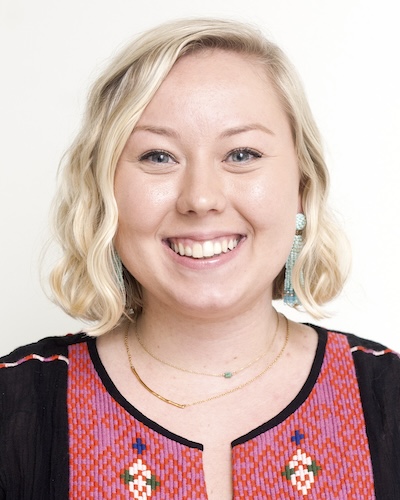
How hard is graduate school? ⟩
December 8, 2017, by Caroline
Admissions Life Hacks
Prospective students frequently ask: how hard is graduate school? What might I be getting myself into? Will I ever do anything other than study? Let’s jump in!
How many days per week do you have class?
The Entry-Level Masters program is full-time; I take up to 18 credit hours per semester, which means I spend 18 hours in the classroom each week. This is usually broken into 6 hours of class, 3 days per week. Most of the time, classes are 9AM-12PM and 1PM-4PM, with a break at noon for lunch. Professors also give us a break in the middle of class to get up, move around, and snack! Additionally, I have Level I fieldwork experiences one day per week. Total, that’s 4 full days per week devoted to schoolwork, with weekends and one weekday off.
For more information, check out our course sequence.
What are graduate school classes like?
Each course is organized differently, but I’ll describe some of the common course designs.
Some courses (OT 538: Current Issues in Practice: Adulthood and Aging or OT 534: Health Promotion and Wellness, for example) are held in a large lecture hall that fits my whole class. These courses are primarily lecture, with some group work mixed in. Often, we will have guest lecturers come in to speak about a particular area of expertise or lived experience, which is cool!
Other thread courses (OT 523: Communication Skills for Effective Practice or OT 518: Quantitative Research for Evidence-Based Practice, for example) are smaller, just with my cohort of about 45 students. These courses include time for lecture and instruction, but also time to work on group activities and semester-long projects.
The 3 practice immersion courses (OT 501: Adult Physical Rehabilitation, OT 502: Mental Health, and OT 503: Pediatrics) are unique in a few ways. Instead of meeting only once per week like the other courses, these courses meet 3 times per week, each time for 3 hours. Twice per week I have lecture for my immersion course with my cohort of about 45 students. I also have lab once per week, which is with just half of my cohort – about 22 students. The immersion courses utilize principles of team-based learning. Instead of sitting in a classroom listening to a lecture for 3 hours straight, a lot of time spent in class is active and interactive. I’m frequently working in groups and teams of classmates on case studies, application activities, discussions, and hands-on learning experiences. This means that my professors expect me to come to class having read the assigned textbook and articles, ready to ask questions about them and then apply what I’ve learned.
For more information, check out our course descriptions.
What about homework, projects, and exams?
Similarly, each course syllabus is structured differently. All courses require textbook and/or article readings each week. Some courses have weekly quizzes on the readings (sometimes taken individually, often taken with a group). Many courses have a midterm exam and a final exam (sometimes cumulative, sometimes not). A few of my classes have had large semester-long group projects, research papers, or presentations. Participation and professionalism are always a component of my final grades, so I always make sure I am in class, prepared for class, and ready to participate!
So . . . how hard is it all?
I’ve truly found graduate school to be quite manageable. When I think about what’s expected of me in the program, 3 things stand out:
- Support
First, the program and the people in it are incredibly supportive; it’s far from a competitive environment. I share notes with my classmates and divide up study guide preparations with friends to make exam prep more manageable. I want my friends and classmates to be the best OTs they can be, so why wouldn’t we help each other out? Faculty and staff have been so relatable and understanding and always make themselves available to answer questions! They understand everything we have on our plates, and they never give us more than we can handle. - Knowing Myself
Second, it’s important to know yourself and how you work. I’ve learned that I work best under pressure. I like to juggle a lot of different things and stay busy, so when I do have time set aside to get work done, I know that I will be productive and efficient. I also very much value balance, and know that I won’t feel happy if I spend all of my time on schoolwork. I have a “No Homework Saturday” rule that I have not broken throughout my entire graduate school experience (I’m quite proud of this). I reserve Saturdays to get out of my apartment, explore LA, and spend time with friends. “No Homework Saturday” has become a mantra among my friends in the program, serving as a reminder that it’s OK to take a break even when the work is piling up. Everyone is different, however, so it’s important to figure out your style so that you can manage your time and responsibilities! - Passion for what I’m learning
Third, and finally, I’m in this program because I am pursuing my passion to become an Occupational Therapist. The curriculum and expectations of me in the program are designed to prepare me to be the best OT than I can be. As a result, I see the value in the courses I take, the assignments I’m turning in, and the pages of reading I complete. The time I spend on schoolwork is not time wasted. Sure, I sometimes have long hours studying, but I feel motivated to study, and not only because I want to do well in school or pass my national boards exam. I also understand that what I’m learning now is information I will continue to be tested on when practicing in the real world for the duration of my career as an OT. Whenever I’m feeling overwhelmed by school, I try and zoom out to see the big picture! It’s hard work, but will definitely be worth it!
In short, graduate school is challenging, but it should be! I’m learning so many new skills, theories, and ways of thinking that I constantly feel like my mind is stretching, but not to the point of feeling overwhelmed. It’s the right amount of challenge, and I always have time for my “No Homework Saturday.” 😊
⋯
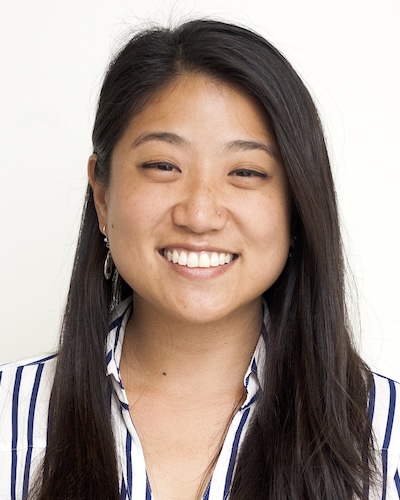
I Can’t Sleep! What Do I Do?! ⟩
December 4, 2017, by Erika
Life Hacks
You ever have a night where no matter how hard you try, you can’t sleep? A few weeks ago, I had one of those nights. My head was spinning a million miles an hour and any time I tried to relax, breathe, or picture myself on a tranquil beach, my mind just zoomed elsewhere and spun a million miles an hour at the next place it ended up! It was complete, and utter, torture.
Each night, whether it’s spawned from stress, depression, anxiety, diet, or physical conditions, millions of people struggle to stay asleep or fall asleep in America. MILLIONS! After my one interminable night, I can’t even imagine how people experience this as a nightly occurrence and somehow function the next day.
So of course, as an OT student would, I took account of my sleep hygiene for that evening. From assessing my memory of the day/night, it went like this:
9:00a - 5:00p: Last day of fieldwork! It was an incredibly busy day seeing patients, saying goodbye to patients, coworkers and CIs. While it was busy, it was full of adrenaline. I came out of fieldwork feeling very energetic!
6:00p: Went home, changed for yoga, drank some iced green tea.
7:15p: Yoga Class
8:30p: Visited a friend and had dinner.
10:30p: Watched an episode of “Stranger Things” S2 with my roommates.
12:00a: In bed, on my phone before bed (like a good Millennial).
4:00a: Tossing and turning in bed, completely awake.
6:30a: Finally fell asleep.
7:30a: Alarm clock rings! -__-
After learning about sleep hygiene and points of consideration that can affect sleep in our OT534: Health Promotion and Wellness class, there are a few things I would have done differently in order to potentially gain restful sleep.
- Avoid caffeine after 3p. I truly believe the iced green tea was a main culprit in keeping me awake till the whee hours of the morning. It was only half a glass! So lethal!
- Wind down. While Stranger Things S2 is SO HARD NOT TO BINGE, it wasn’t the best way to wind down before bed. Episode 4 made my energy and excitement rise up to my eyebrows that it took time for my heart, brain, and body to relax. For the future, knowing that STS2 is hella thrilling, perhaps I will make it a point to start watching it earlier in the night and avoid watching it right before bed!
- Reduce phone activity before bed. As many people know, blue light (from your phone or laptop) stimulates your body similarly to it’s response to daylight and thus, can wake your body up more then prepare it for sleep. Therefore, it’s encouraged to either adjust your phone settings to night time mode and make sure to reduce the amount of phone time prior to going to sleep.
- Don’t lie in bed awake. A good rule of thumb is that if you are awake in bed for more than 15-20 minutes, get up and do something. Refrain from highly stimulating activities like television or looking at your phone and try reading a boring book or magazine. Alternative activities can include stretching, breathing, or even utilizing a relaxation app like “Sleep Pillow Sounds” or “Sleep Time.”
⋯

The 4 Thanksgiving Fs: Food, Friends, Football, and Family ⟩
November 21, 2017, by Caroline
Getting Involved Life Hacks
It might not be Thanksgiving quite yet, but the Thanksgiving spirit is definitely in the air (can you tell from Bryan and Ali’s posts?). Well, you lucky readers, here comes one more Thanksgiving appreciation blog!
This past weekend was filled with three of my favorite Thanksgiving occupations: food, friends, and football.
On Friday night, I journeyed out to a classmate’s house a couple hours outside LA for an early Thanksgiving with friends. It was truly one of the highlights of my semester. Let me tell you — the air was so fresh and I could see stars in the sky! I’ve definitely gotten used to big city life (and all of its perks) but it was a breath of (literal) fresh air to get out of the city for a night! We had a huge buffet of food, a fire pit, and so many laughs. It was a great chance to get together with friends who aren’t in my cohort and catch up!
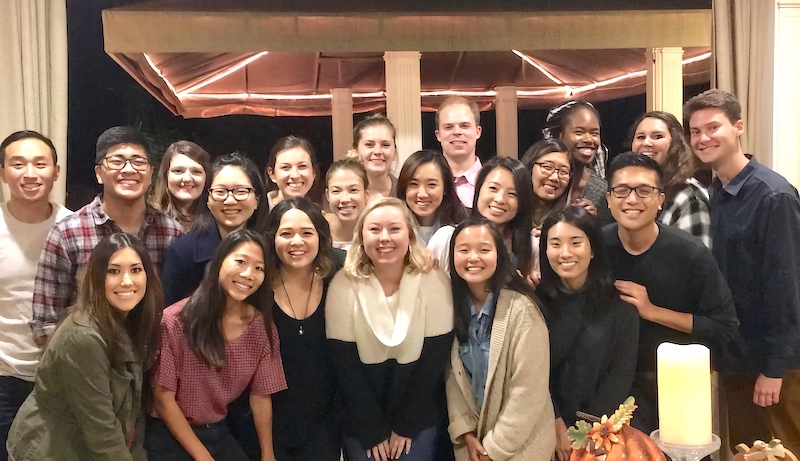
A food- and friendship-filled early Thanksgiving celebration with wonderful friends from the program.
On Saturday, I went to the USC vs. UCLA football game. Our OT programs were actually being recognized at the game, so a big group of us got to go onto the field for a photo op before warm ups. Definitely a different view than the one I’m used to from the student section! We were also featured on the screen during the game — how cool right?! After the photo op, I went to the OT and Physical Therapy tailgate (gotta love the interprofessional mixing!) before heading to the game (which we won!!). Go Trojans!
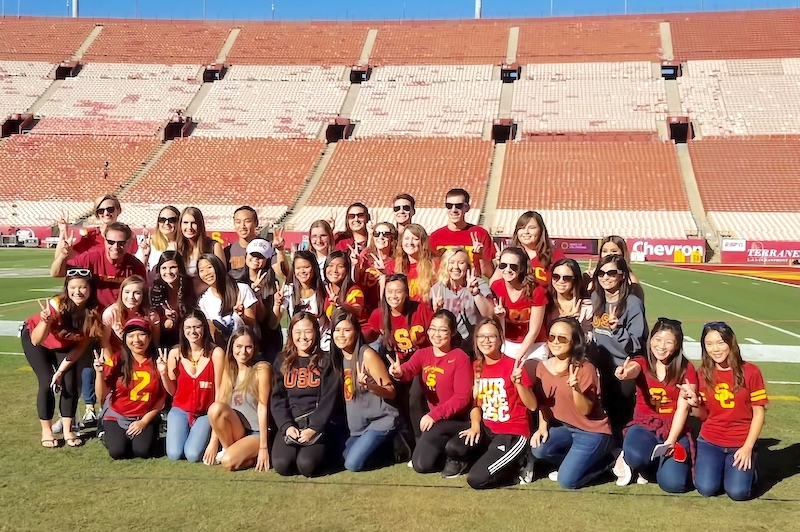
Here’s the picture of our whole group out on the field. Check out those V’s for victory!
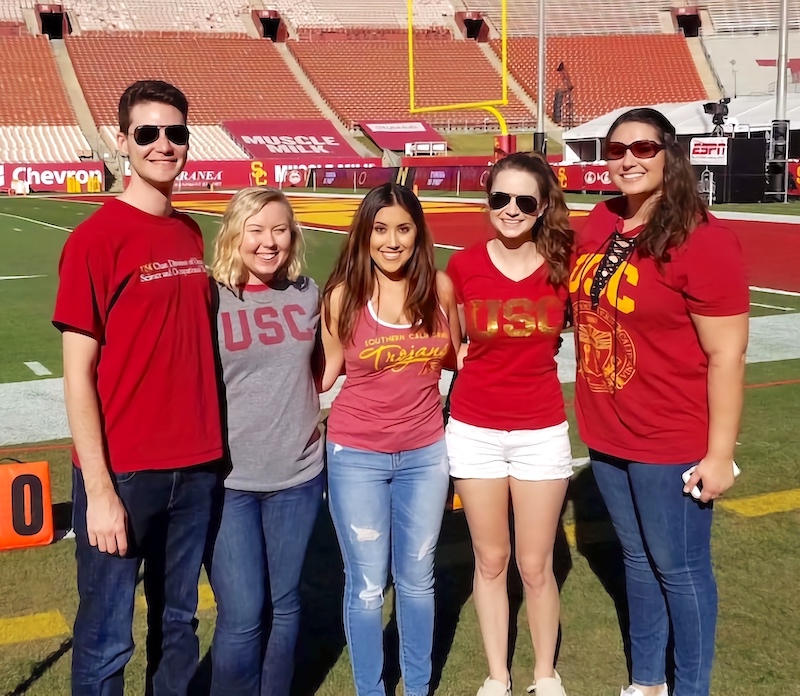
Another photo from our experience on the field!
Food, Friends, and Football — it was definitely a fun weekend. “And the last F?” my detail-oriented readers might ask. Family time is coming soon! In fact, I’m writing this from none other than LAX airport waiting to board my flight back home to North Carolina. As I was packing my sweaters and winter clothes and gearing up for colder weather back on the East Coast, I jokingly texted my mom that I’d rather stay in LA for 90 degree Thanksgiving weather. She knew exactly what would convince me to come home — pictures of my dogs that are (almost) as excited for me to come home as my human family. Guess I could add one more F to my list of Thanksgiving words: fluffy pups. Photos of the pups included to increase the cuteness factor of this blog post:

Meet Sadie, who is very excited to lounge with me on the couch. Look at those needy eyes!
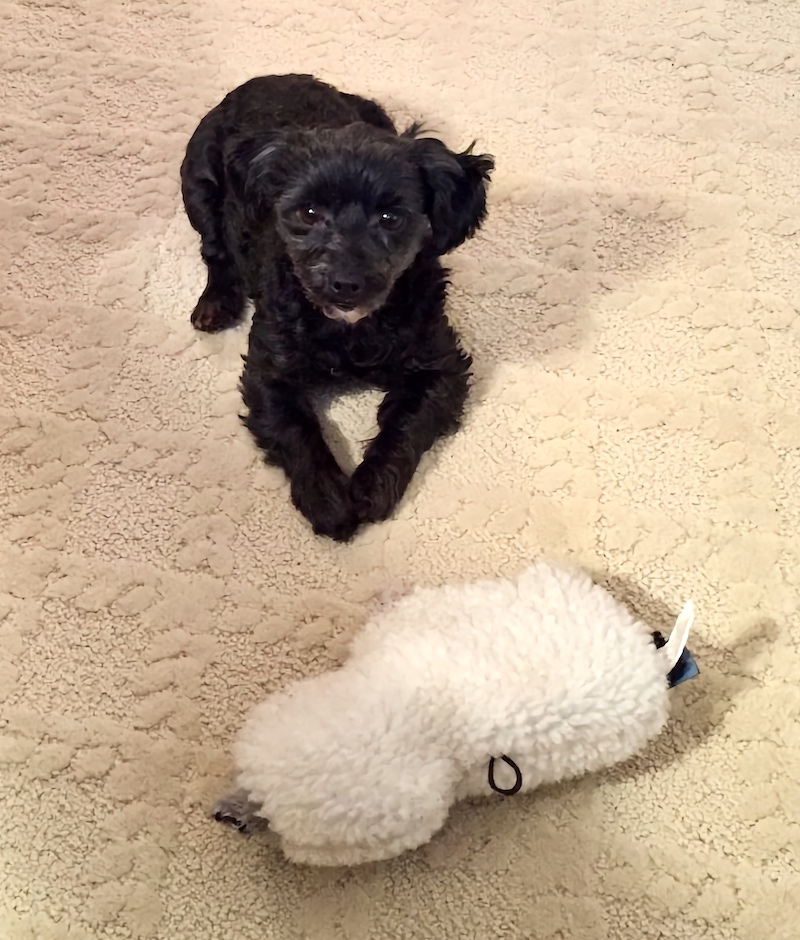
Meet Gracie, who is excited to have another human at home to play with her!
Looking forward to a few days off from school before heading back for the last week of classes and final exams. Happy Thanksgiving to all!
⋯
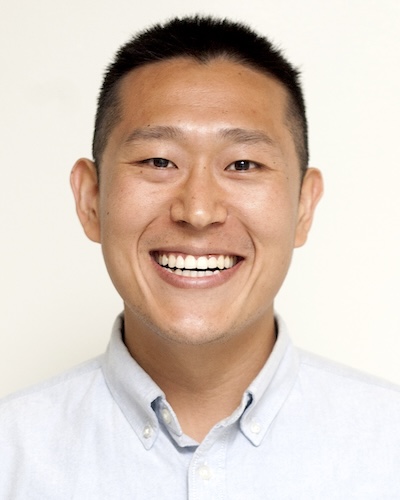
My Favorite Holiday ⟩
November 21, 2017, by Bryan
Life Hacks Living in LA
More than the food, football, and even times with family, I love Thanksgiving because it forces me for at least one day to stop complaining (“OMG Adult Rehabilitation is so tiring”) and try to focus on expressing gratitude. So, here are a few things I am thankful for in relation to OT and my time here at USC:
- Cohort B. Wow, it is an understatement to say that all my classmates at OT school, especially my cohort, are some of the best people I have had the opportunity to work with. I am especially grateful for cohort B because with the grind of the semester, they definitely see the worst of me. Whenever I am tired or grumpy or just over having to write short term and long term goals for ADLs, my cohort members consistently great me with a smile or ask me how I am doing. It has been a very unique and uplifting experience to feel so cared for throughout the rigors of balancing graduate school and life.
- Eric Cohen Student Health Center Free Coffee. I was honestly thinking about making this #1. Free coffee from Eric Cohen Student Health Center is the lifeblood of this program for me.
- Fieldwork educators and experiences. I have been really lucky with some great fieldwork placements throughout the program (inpatient rehabilitation facility for adult rehabilitation, pediatrics acute inpatient rehabilitation, and clubhouse setting for adults with developmental disabilities). At all three sites I had great clinical instructors/supervisors who challenged me as a clinician and helped me grow in applying what I learned in class into practice. I grew in the skills of building interpersonal relationships and establishing rapport with clients and their families. I learned how to study and come prepared to fieldwork the next day only to have all my plans thrown out the window and need to adapt to an entirely new situation and circumstances.
- Student Ambassadors. Last but not least, it has been a great privilege to be part of the Student Ambassador team this year. I honestly thought the position would be a really tough time commitment throughout the semester, but I am surprised how fun it has been giving tours and information sessions as well as presentations to prospective students. I realized how much I enjoy getting to know other people and seeing their own discovery of OT grow. It has also been so fun working with my fellow Ambassadors! It is difficult to see friends in different cohorts, so I am grateful we get to work together.
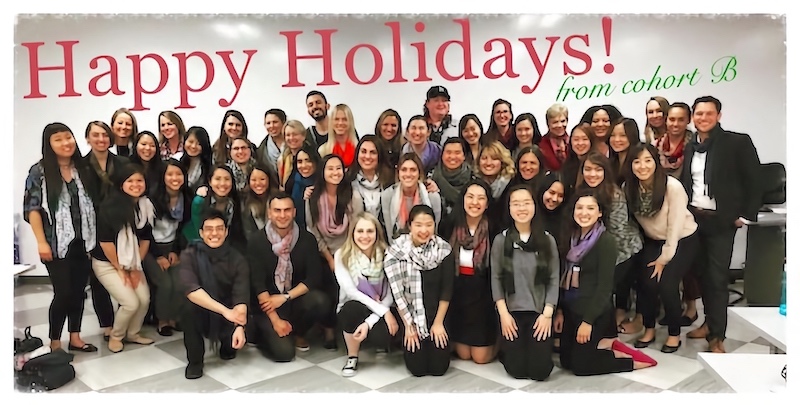
Cohort B Class of 2018
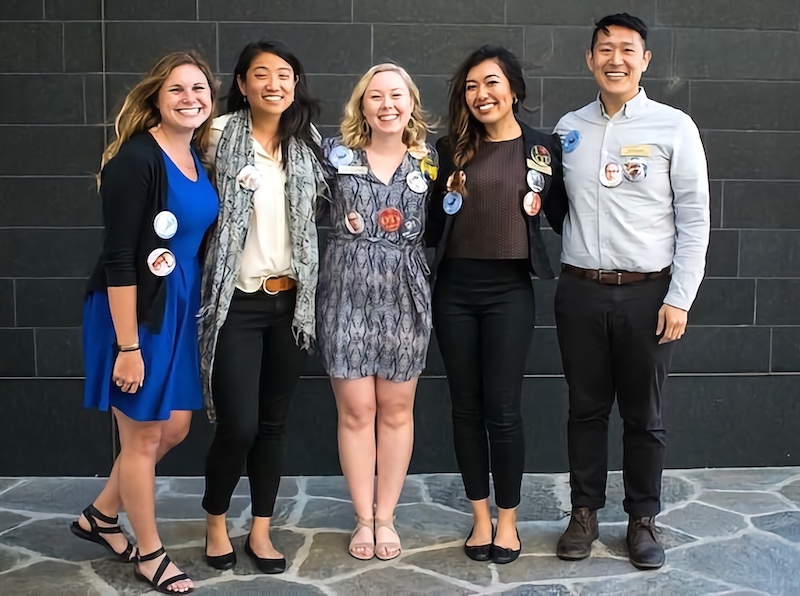
Student Ambassadors 2018
Happy Thanksgiving everyone!
⋯





